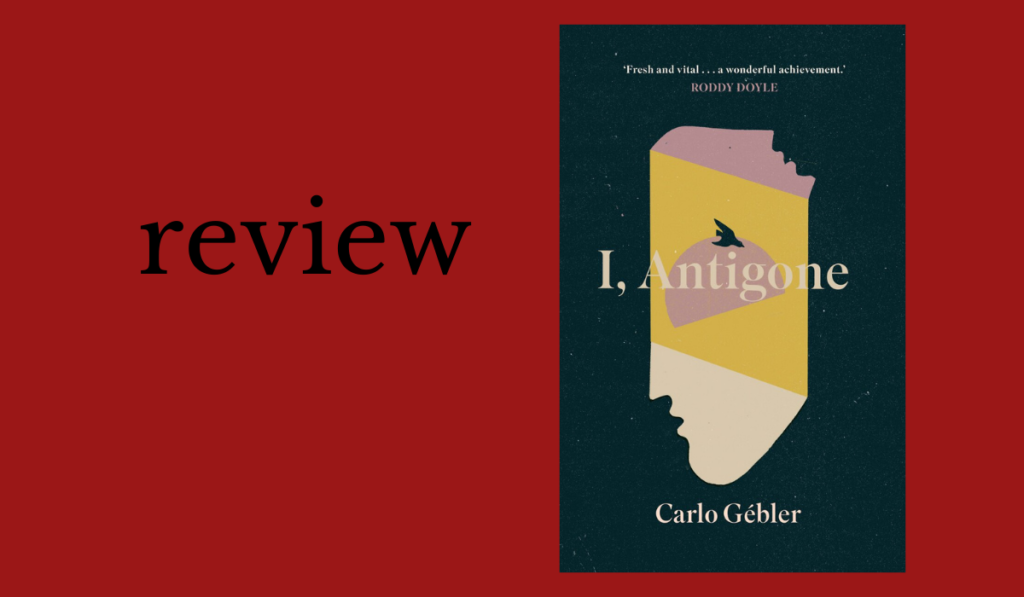
I, Antigone|Carlo Gébler|New Island|ISBN:978184840812|€15.95
“In the classical world one disobeys a godly injunction at one’s peril.”—David Butler on a Greek tragedy, retold.
I, Antigone
What has come down to us of Greek tragic drama is dominated by two cursed houses – the House of Atreus in Mycenae, and the House of Labdacus in Thebes.
They’ve given us the names of both of Freud’s celebrated parent-fixations, one derived from either cycle: respectively, the Electra and Oedipus complexes.
In each house, an ancient wrong has set in motion a bloody sequence of strife and retribution working itself out through generations, the principal actors often spurred on by factional gods. To obey one god’s imperative will be to disobey another’s – witness the competing imperatives faced by Orestes or Electra or Antigone – in what Hegel memorably called ‘the clash of right against right’.
Classical concepts
This is one reason why, in watching these dramas today, classical notions of responsibility, of agency, free will, morality, culpability, even of character seem so foreign to us. In this inhuman cosmos, you can be condemned for what you do unawares, even for what you are fated to do.
Centuries before their various dramatic treatments by Aeschylus, Sophocles and Euripides, these stories were entirely familiar to Greek audiences. This intimacy is what made dramatic irony possible, much as it operates nowadays in films such as Titanic or Pearl Harbour or JFK – think of the shiver of anticipation in Michael Collins when, on the eve of his trip to Cork, Liam Neeson declares “sure they’d never shoot me in my own back yard’.
Set precisely on the fault-lines running between the political and the domestic, these ancient tragedies of parricide, fratricide, incest and taboo set the template, via the Latin playwrights, for Shakespearean political drama. A Lear or a Macbeth or a Hamlet would be unthinkable divorced from their familial contexts and jealousies.
I’d argue that it is this close focus on the hothouse of the dysfunctional family that gives them their enduring fascination down the millennia, and remains the template for the contemporary political saga.

Original fascination
But the originals have never lost their fascination. If Catherine Dunne adapted the House of Atreus cycle for her 2016 novel The Years that Followed, Colm Tóibín has the tortured daughter Electra narrate the myth directly in his House of Names of the following year. This is essentially the strategy adopted by Carlo Gébler for I, Antigone.
Antigone’s dictated narrative is divided into twelve books and an epilogue, with occasional interjections in italics which, although in Antigone’s voice, provide an aphoristic commentary on the action in a manner that recalls the choric interludes in Greek drama.
Book One of her account takes us right back to an original ‘outrage’ – the abduction and rape of Europa by Zeus, in the form of a bull, and their vain pursuit by her brother Cadmus. Having consulted the Delphic Oracle, he becomes instead the founder of the city-state of Thebes. To help him in the latter task, Cadmus famously slew a dragon and sewed its teeth, giving rise to a ferocious cadre of warriors, the Spartoi, only five of whom survived their immediate, internecine fighting. In I, Antigone a helpful family tree shows how Oedipus’ wife and mother, Jocasta and her brother Creon have one of these five Spartoi among their ancestors.
Three Theban plays
The account now jumps forward several generations to Antigone’s more immediate family, to her grandfather Laius and mother, Jocasta. The three Theban plays of Sophocles which Gebler uses as his principal source abound in echoes and symmetries, an architecture that is one of the reasons for their enduring fascination.
As is the case with Oedipus, his father Laius is raised by a neighbouring king before returning to claim the vacant throne of his native Thebes, where he takes Jocasta as his wife. Much of the culpability passed down through the several generations to follow derives from Laius’ secretive rape and abduction of this neighbouring king’s son, Chrysippus, whom Laius wishes to turn into his catamite, and the shamed youth’s subsequent suicide. As a consequence Laius and Jocasta are cursed initially with childlessness, and when Laius consults the Delphic Oracle, he is warned that if he has a son, he will die at his hands. Jocasta, unaware of the outrage to Chrysippus and the full force of the prohibition, contrives to have a child by Laius in secret.
In the classical world one disobeys a godly injunction at one’s peril.
Translations
From Book Seven on, the myth becomes more familiar, particularly to those who have seen Sophocles’ Oedipus the King in performance – far fewer readers, one imagines, will have seen or read Oedipus at Colonus. Besides, it is not the place of a literary review to merely provide a summary of a plot.
What is interesting is that, for his attempt at literary ventriloquism, Gébler should have chosen the translation of E.F. Watling (Penguin Classics, 1973) rather than, say, the more recent version of Robert Fagles (Penguin Classics, 1982) or the earlier, critically acclaimed translation of H.D.F. Kitto (OUP, 1962).
In his introduction, Watling declares ‘I have taken as my first aim the production of a readable, and actable, dramatic text, not a line-for-line, word-for-word transcription of the original.’
As his version is intended principally for live performance, Watling goes on, ‘A literal translation can result only in prose – or worse, a strained versification – which may faithfully (and rightly, for some purposes) preserve the quite un-English constructions and thought processes of the original, but cannot possibly be spoken as living English.’
Now self-evidently, Gébler’s novel is not intended for dramatic performance, and one quality that strikes the reader is precisely ‘the quite un-English constructions and thought processes’ of the account. This is apparent both in Antigone’s rendering of the various protagonists’ speeches, which are frequently aphoristic and occasionally governed by sustained Homeric simile, and in the dictated narrative itself. Thus:
Cadmus gathered his dead companions, their bodies and their heads. He dug a pit and buried them. That done, he could now give the goddess Athene her due. He fetched the cow to the pool. He scrubbed her. He built an altar and lit a huge fire. He threw lustral water and barley corns on the ground. He cut a lock from the cow’s head and threw it on the flames and offered prayers to Athene.
It has an archaic feel. To put it bluntly, it reads like a translation. But as a text purportedly dictated by Antigone herself, this is surely as it should be.

David Butler is a novelist, short story writer, playwright and poet. He is the author of City of Dis (New Island), and All the Barbaric Glass (Doire Press). His forthcoming collection Liffey Sequence is available to pre-order from Doire Press.











